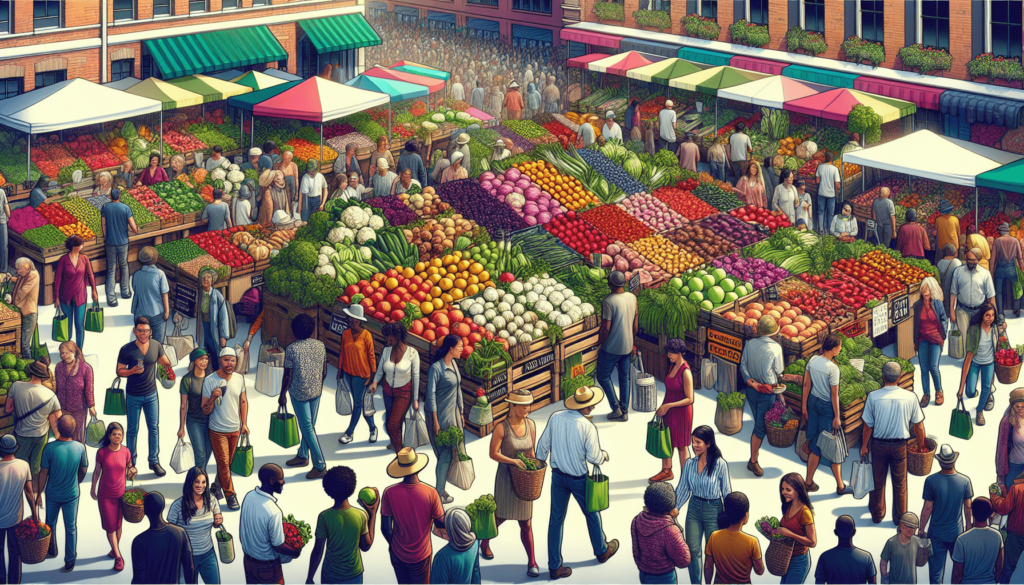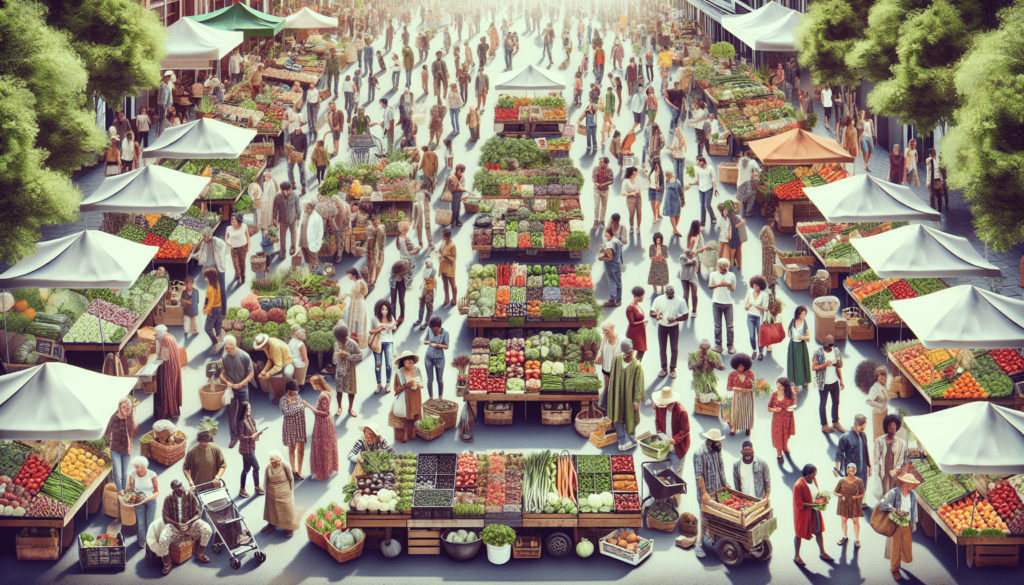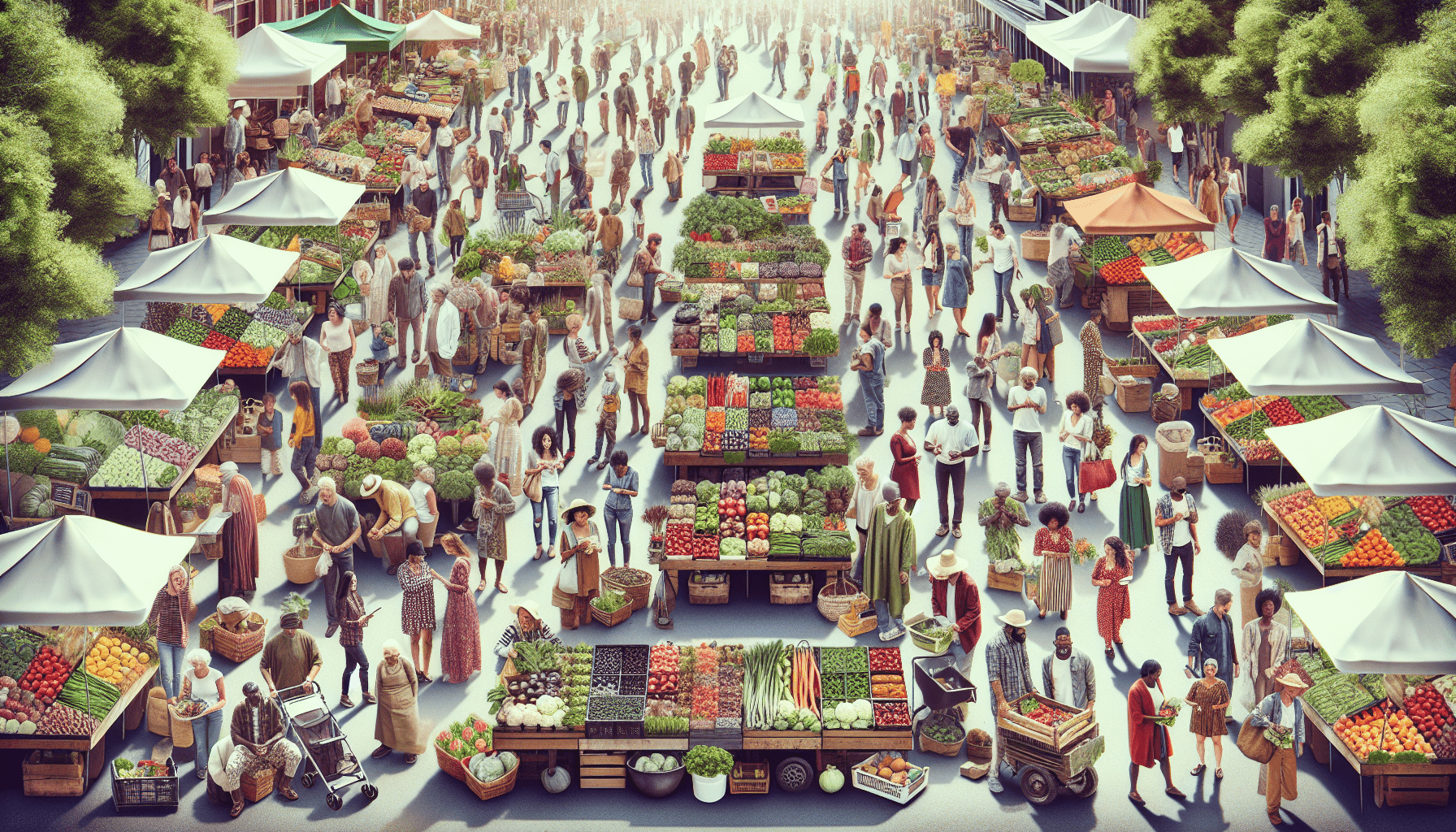Imagine a world where farmers play a crucial role not only in providing us with nutritious food, but also in shaping the economic landscape of their local communities. Sustainable farming practices go beyond just growing crops; they have a profound impact on the environment, social well-being, and prosperity of the areas they operate in. In this article, we will explore the fascinating ways in which sustainable farming is transforming local economies, fostering a more resilient and equitable future for all. Get ready to discover the untold stories of farmers who are changing the game and redefining the concept of success.

Increased Economic Activity
Sustainable farming practices have a significant impact on local economies, contributing to higher farm revenues and job creation. By adopting sustainable techniques, farmers can improve their yields and reduce production costs, leading to increased profits. Additionally, sustainable farming practices often require more hands-on labor, creating job opportunities in rural areas where unemployment rates may be high. These jobs not only provide economic stability but also enable individuals to develop valuable skills and contribute to the overall growth of the community.
Moreover, sustainable farming practices support local businesses. Farmers who implement sustainable techniques often prioritize sourcing supplies and equipment locally, stimulating the local economy. This helps local businesses thrive and creates a network of support within the community. From purchasing agricultural supplies to hiring local contractors for infrastructure improvements, sustainable farming practices have a ripple effect on the entire supply chain, boosting economic activity in the region.
Reduced Environmental Costs
One of the most important benefits of sustainable farming is the reduction of environmental costs. These practices emphasize the conservation of natural resources, such as water and soil. By implementing techniques like drip irrigation and soil conservation methods, sustainable farmers minimize water waste and erosion, ensuring the long-term viability of their land.
Additionally, sustainable farming practices reduce pollution. Traditional farming methods often rely on heavy pesticide and chemical fertilizer use, resulting in run-off that can contaminate nearby water sources. In contrast, sustainable farmers prioritize organic and natural alternatives, minimizing the release of harmful chemicals into the environment. This contributes to cleaner waterways and healthier ecosystems, benefitting not only the local community but the wider region as well.
Preserving biodiversity is another crucial aspect of sustainable farming. By avoiding genetic monocultures and promoting crop rotation, farmers can maintain a variety of plants and animals on their land. This not only preserves the natural balance of ecosystems but also ensures the sustainability of agriculture in the face of potential threats like pests or disease outbreaks.
Enhanced Food Security
Sustainable farming plays a vital role in enhancing food security at the local level. By adopting sustainable practices, farmers can ensure a stable local food supply, reducing reliance on imports. This strengthens the resilience of the community, particularly during times of global crises or disruptions in the supply chain. When local farmers are able to produce a wide range of food items sustainably, the community can enjoy a diverse and reliable food source, promoting food security and stability.
Sustainable farming practices often focus on improving soil health, leading to higher nutrient levels in crops. This, in turn, enhances the nutritional value of the food produced. By prioritizing organic methods and avoiding chemical additives, sustainable farmers can provide the community with fresh and nutritious food options, contributing to improved public health.
Diversified Income Streams
Another positive impact of sustainable farming on local economies is the creation of diversified income streams for farmers. Sustainable farmers often explore value-added products, such as organic honey, artisanal cheeses, or specialty preserves. By turning raw agricultural products into unique and high-value items, farmers can command premium prices and increase their revenue streams. These value-added products not only attract consumers who appreciate quality and sustainability but also contribute to the prosperity of the local economy.
Agro-tourism is another avenue for farmers to diversify their income streams. By opening their farms to visitors, offering educational tours, or hosting events, sustainable farmers can create memorable experiences for tourists while generating additional income. This not only brings tourism dollars into the community but also fosters a connection between urban and rural areas, promoting understanding and appreciation for agricultural practices.
Moreover, direct sales and farmers’ markets provide an opportunity for sustainable farmers to engage directly with consumers and build relationships. By cutting out the middlemen and selling their produce directly, farmers can maximize their profits and ensure fair compensation for their hard work. Farmers’ markets serve as vibrant community spaces, attracting visitors and supporting local entrepreneurs, further stimulating economic activity.

Increased Community Resilience
Sustainable farming practices contribute to increased community resilience, reducing vulnerability to market fluctuations and enhancing disaster management capabilities. Unlike industrial farming, which is often heavily reliant on global markets, sustainable farmers focus on producing for local and regional consumption. This reduces the community’s exposure to price fluctuations in global markets, ensuring a stable income for farmers and a reliable food supply for local residents.
Sustainable farming practices also foster social cohesion within the community. By collaborating on shared goals, such as protecting the environment or promoting sustainable practices, farmers and community members build strong relationships and a sense of unity. This cohesion enables communities to come together during times of crisis, supporting one another and finding innovative solutions to shared challenges.
Furthermore, sustainable farming practices improve disaster management capabilities. By embracing techniques that enhance soil health and water conservation, farmers can better withstand extreme weather events like droughts or floods. This resilience ensures that communities can quickly recover from disasters and reduces reliance on external aid, enabling them to bounce back stronger and faster.
Health and Wellness Benefits
Sustainable farming practices have numerous health and wellness benefits for both farmers and consumers. By prioritizing organic and natural farming methods, sustainable farmers provide access to fresh and nutritious food options for the local community. Consuming fruits, vegetables, and animal products that are free from harmful chemicals improves the overall health and wellbeing of individuals.
Engaging in sustainable farming practices also promotes physical activity. Unlike traditional farming, which often involves heavy machinery and chemical-intensive techniques, sustainable farming requires more hands-on labor. This physical activity contributes to healthier lifestyles and can reduce the risk of chronic diseases associated with sedentary lifestyles.
By avoiding the use of synthetic pesticides and chemical fertilizers, sustainable farmers reduce consumers’ exposure to harmful chemicals. This is particularly important for vulnerable populations such as pregnant women, children, and individuals with compromised immune systems. By choosing sustainably produced food, individuals can enjoy the peace of mind that comes with knowing they are consuming safe and healthy products.
Education and Skill Development Opportunities
Sustainable farming practices provide valuable education and skill development opportunities for farmers and youth alike. Training in sustainable farming practices equips farmers with the knowledge and techniques to improve their productivity while minimizing environmental impact. By learning about soil conservation, water management, and crop rotation, farmers can enhance their agricultural practices and achieve long-term sustainability.
Furthermore, supporting agricultural research initiatives allows farmers to stay updated on the latest advancements in sustainable farming. Research institutions and agricultural organizations often collaborate with farmers to develop and test new methods, tailored to local conditions. This research not only benefits individual farmers but also contributes to the collective knowledge of the farming community as a whole.
Providing learning experiences for youth is another aspect of sustainable farming. By offering internships, workshops, or educational programs, sustainable farmers can expose young individuals to the diverse and rewarding world of agriculture. These experiences not only promote an appreciation for nature and food production but also inspire the next generation of farmers and sustainable agriculture advocates.
Positive Impact on Property Values
Sustainable farming practices can have a positive impact on property values, making rural areas more attractive to homebuyers. The presence of sustainable farms contributes to the preservation of rural landscapes, which are highly valued for their aesthetic beauty and tranquil surroundings. Homebuyers seeking a peaceful lifestyle, away from the hustle and bustle of urban areas, are often drawn to communities with sustainable farming practices, contributing to increased demand for properties.
Moreover, sustainable farming practices can increase land values. Lush and well-maintained farms not only enhance the overall appeal of an area but also contribute to its economic value. Land that is suitable for sustainable agriculture is often seen as an asset, enticing investors and developers. This increased demand for agricultural land can have a positive effect on property values in rural areas, benefiting both farmers and the wider community.
Preserving rural landscapes through sustainable farming practices also helps protect the unique cultural heritage of an area. The slower pace of rural life and the connection to the land and its traditions are aspects highly valued by residents and visitors alike. By preserving rural landscapes, sustainable farms contribute to the region’s cultural identity and create opportunities for cultural heritage promotion, attracting tourists who appreciate and support local traditions.
Government and Policy Support
Government and policy support are crucial for the successful integration of sustainable farming practices into local economies. Governments can provide financial incentives for farmers who adopt sustainable techniques or offset the costs associated with transitioning to more environmentally friendly farming methods. These incentives can encourage farmers to embrace sustainable practices, making them more financially viable and appealing.
Implementation of supportive policies is another way governments can contribute to the growth of sustainable farming. Policies that encourage the use of organic fertilizers, regulate pesticide use, or promote crop rotation can create a favorable environment for sustainable farmers. By establishing regulations that prioritize sustainability, governments can protect the environment, public health, and the interests of both farmers and consumers.
Moreover, collaboration between government entities and farmers is essential in market development. By working together, governments and farmers can identify opportunities, develop strategies, and access resources to promote sustainable farming products. This collaboration can range from participating in trade fairs or exhibitions to establishing regional branding and marketing campaigns, aimed at showcasing the unique qualities and benefits of locally produced sustainable farm products.
Tourism and Marketing Opportunities
Sustainable farming practices present excellent opportunities for tourism and marketing. Promoting sustainable farming practices can attract tourists who are interested in experiencing and supporting sustainable and ethical agriculture. Highlighting the connection between food production and the natural environment, sustainable farms can offer educational tours, farm-to-table dining experiences, or even hands-on farming activities for visitors. This not only generates additional income for farmers but also promotes sustainable tourism, fostering a deeper understanding of the food system and a greater appreciation for agricultural practices.
Cultural heritage promotion through local products is another avenue for sustainable farmers to market their goods. By embracing traditional methods and preserving unique local varieties, farmers can create products that reflect the cultural identity of the region. Authentic and locally produced goods often have a story to tell, appealing to conscious consumers who appreciate the history and traditions behind the products they purchase.
Furthermore, regional branding and marketing campaigns can enhance the visibility and competitiveness of sustainable farming products. By collaborating with other local farmers, producers, and organizations, sustainable farmers can establish a strong brand identity for their region. This collective effort can leverage the strengths and unique qualities of the local agricultural sector, attracting consumers who are looking for sustainable and high-quality products.

